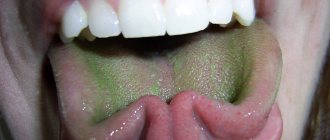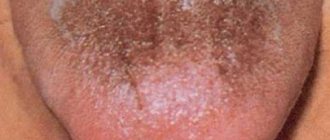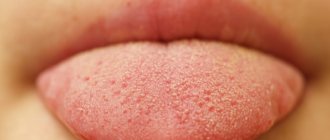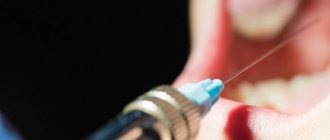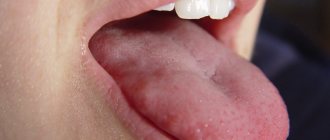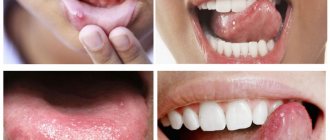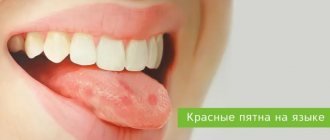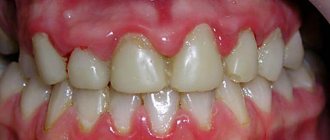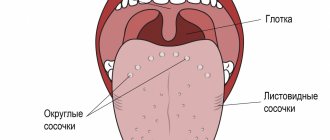A callus on the tongue (tipun, pimple) is an inflammatory lesion of a certain area of the tongue, caused by the appearance of a crack in the mucous membrane and infection. In some cases, a pip on the tongue indicates serious illness, so you should not delay your visit to the doctor. Only he knows what to do for this or that patient in this case.
Quite often, microtrauma of the tongue in combination with insufficient oral hygiene leads to the development of glossitis. These injuries may be the result of mechanical damage (for example, from seeds or chewing candy), burns, or an infectious process. In some cases, the cause of a callus on the tongue is an allergic reaction.
Causes
Often, damage to the tongue is caused by an incorrect bite, chipped teeth or fillings. If, after receiving an injury, the patient thoroughly cleans his mouth, the disease will not develop. However, if this rule is not followed, sooner or later the infection will still get into the wound and cause inflammation.
Most often, a pip on the tongue occurs in patients who:
- smoke or abuse alcoholic beverages;
- often eat spicy, sour or salty foods;
- consume hot foods and drinks;
- recently suffered poisoning;
- due to various reasons they have weakened immunity.
Nutrition
The first step is to remove the load from the tongue so that the disease does not worsen. To do this, use a special diet that limits the consumption of salty, sweet, pepper and spicy foods, and excludes alcohol, carbonated drinks, juices, various sauces, ketchup and mayonnaise from the diet.
Food should be soft, easy to chew, without touching the inflamed areas. This could be mashed potatoes, soy pudding, chicken broth, fruit yoghurts.
If the cause of the callus is an infection, the consumption of fermented milk products is strictly prohibited. The bacteria it contains create a favorable environment for the development of pathogenic organisms, which can aggravate the situation and slow down the treatment process.
Signs
When a callus appears on the tongue, the patient may feel a burning and tingling sensation. If the callus is located at the tip of the organ, numbness may also be present. With a large callus, the patient may complain of pain while eating. In this case, the tongue often swells, increases in size and becomes bright red.
The callus itself looks like a skin pimple, inside of which there is serous exudate. In the absence of proper treatment, this exudate is replaced by pus, resulting in the formation of an abscess on the mucous membrane.
Subsequently, a bleeding wound appears at the site of the callus. It brings the patient much more unpleasant sensations than a callus. In addition, it is more difficult to treat.
Drug treatment
Despite the fact that the callus causes a certain discomfort and, accordingly, the desire to pierce or scratch it, this is absolutely forbidden. Since this lesion is located on the mucous membrane, treatment should be as gentle and correct as possible. This is the only way to avoid complications. So how to treat calluses?
Most often, treatment of a callus on the tongue is carried out in the following order:
- The load is removed from the tongue. To do this, patients must give up salty, spicy, sour, hot, cold, as well as hard and scratchy foods. In general, until recovery, it is better to eat various cereals, broths and vegetable salads.
- Brushing your teeth should happen at least 2 times a day. After each meal, you need to rinse your mouth with antibacterial and anti-inflammatory agents. For this purpose, you can use Chlorhexidine, Furacilin or a weak solution of potassium permanganate. In addition, you can prepare your own decoction of sage or chamomile. For this you need 1 tbsp. l. dry herbs pour a glass of boiling water. The product is considered ready for use immediately after cooling. These decoctions are ideal for young children, as well as pregnant and breastfeeding women.
- To eliminate pain, you can use painkillers in the form of a spray (for example, Lidocaine).
- If you feel severe dryness in the oral cavity, you can treat it with anesthesin in combination with glycerin. These actions are performed only in a medical institution.
The situation is much worse with calluses on the tongues that have arisen against the background of ulcers and erosions. In this case, you need to clean your tongue from plaque. For this purpose, special medicinal solutions are used (most often chymotrypsin and trypsin). At the end of the procedure, the tongue is treated with a weak, warm antiseptic. At home, after this, to speed up the healing of the mucous membrane, the patient can use rosehip or peach oil, as well as Solcoseryl gel.
If the callus appears due to a decrease in the body’s defenses, the patient may be additionally prescribed immunostimulating medications (Isoprinosine, Lavomax), as well as vitamin and mineral complexes (Complivit, Alphabet, Perfectil).
If the callus becomes very hard, surgical treatment may be recommended. In addition, agents that eliminate pathogenic microflora present in the oral cavity must be prescribed. Antifungal medications, antibiotics and antivirals are used for this.
If the tongue is severely swollen, antihistamines and decongestants can be used.
If there is a strong increase in body temperature, antipyretic and anti-inflammatory drugs may be prescribed. If the patient’s tongue has enlarged and as a result, suffocation occurs, treatment can be performed with hormonal drugs.
Symptoms that require immediate medical attention
Dentures can be uncomfortable from the start. This may be caused by its incorrect manufacture, or simply by discomfort caused by the appearance of a foreign object in the oral cavity. In the first days, it is strongly recommended not to remove the structure so that you can get used to it, so that all the mucous membranes adapt. But if the pain intensifies, the gums become inflamed and it is really impossible to wear a denture, you should consult a doctor.
System correction is also necessary in the following situations:
- Bite disturbances occur when the jaws are closed, regardless of how many dentures are installed - only on one jaw or on both jaws at once,
- It’s impossible to chew with new teeth – it’s uncomfortable and even painful,
- ulcers form on the gums under the structure, the gums bleed,
- there is continuous and painful contact of the prosthesis with the mucous membranes - the inside of the lips and cheeks,
- the structure does not hold, it shifts under load,
- burning of the mucous membrane, severe dry mouth, rash in the oral cavity.
Folk treatment of pipuna
To speed up the healing process, the patient can use non-traditional methods of therapy along with traditional ones.
Bee products are often used for this purpose. For example, propolis tincture or liquid honey. In this case, you need to lubricate the tongue in the affected area with medicines or apply a cotton pad soaked in the product to the tip and hold the compress for 10-15 minutes. Toothpastes containing propolis also have a healing effect.
Bee products quickly relieve inflammation, irritation and accelerate tissue regeneration. Despite their enormous benefits for the body, the use of honey by patients prone to allergic reactions is still not recommended, since in this case the risk of side effects cannot be excluded.
For calluses on the tongue, the juice of raw potatoes can be of great benefit. To do this, you need to take several medium-sized potatoes, peel them and grind them in a meat grinder, then squeeze out the juice using several layers of gauze. You need to dip a cotton pad in the juice of this root vegetable, and then apply it to the affected area, but there is no need to press on the area. You need to hold such a compress for quite a long time (the longer the better), but in any case the procedure should not last less than 10 minutes. With the help of such a compress, you can eliminate inflammation and draw fluid out of the tip.
Horseradish can also help in treating calluses. In this case, you need to pour 100 g of plant root minced in a meat grinder into 100 ml of distilled water. After this, the container with the ingredients must be placed on the fire, brought to a boil and boiled in this way for 15 minutes. You need to make compresses from the prepared broth in the morning and evening for 5-10 minutes. This remedy cauterizes the callus and relieves inflammation.
If you don't have horseradish root, you can use garlic. To do this, cut a clove of garlic in half and attach it to the tip. The course of treatment is until the symptoms of the disease disappear completely.
Microprosthetics for tooth restoration
To restore the aesthetics and full function of a damaged tooth, restoration is used. If the chip is small, the problem can be solved using composite materials. For more significant damage, microprosthetics would be an excellent option. Inlays, which serve as microprostheses for restoring teeth, are made from composite materials based on an impression. They are durable and aesthetic, and are widely used in modern dentistry.
Micro-prostheses also include veneers. These are thin plates that are attached from the outside to the prepared teeth (in the frontal zone of the dentition, covering the front part and lower edge of the tooth). Veneers are also made from impressions and are effective in correcting most aesthetic problems. The plates are mainly made of ceramics and zirconium dioxide.
If the injury affects the pulp, the specialist treats the canals, and then fills or installs a microprosthesis.
Prevention
The main rule for preventing calluses on the tongue is to regularly increase immunity (if the body’s defenses are weakened, a tip will form on the patient’s tongue from time to time, even if it has previously been successfully treated).
To do this, you need to eat properly and balanced, play sports, harden yourself, follow a work and rest schedule, stop smoking and drinking cigarettes, avoid stressful situations, and also use drugs with lactobacilli after completing a course of antibiotic treatment. For this purpose, you can also purchase Echinacea tincture and fish oil at the pharmacy. They have a low cost and are sold without a doctor’s prescription, but at the same time they bring incredible benefits to the body.
Oral hygiene should be carried out regularly - it consists not only of brushing your teeth, but also your tongue, as well as rinsing your mouth after each meal.
You should visit the dentist for a preventive examination of the oral cavity and detect diseases at the earliest stages at least once a year. Treatment of any dental diseases should be carried out as soon as possible.
Patients prone to allergic reactions should be extremely careful with new foods (especially exotic ones) and oral care products.
Growth on the gum: why it appears and how to treat
A growth has appeared on the gum: what is the cause
Infectious diseases
Non-communicable diseases
Types of growth
Gum cancer
Lump after crown installation
Growth on the gum: how to treat
Which doctor should I contact if a growth appears on the gum?
Normally, the gums have a smooth, pale pink texture. Any change, be it a thickening or a growth, signals problems in the body that cannot be ignored, as they pose a health hazard. Why lumps appear on the gums and how to treat them, we will tell you in the article.
Possible complications
In the initial stages, callus is a completely harmless disease, but if not treated in a timely manner, it can lead to serious complications. Among these are the spread of infection from the lesion to nearby tissues, the formation of warts, phlegmon of the tongue (purulent abscess) and the transition of the pathology to a chronic course. In the latter case, the patient may eventually lose adequate taste perception, speech may be impaired, and salivation may increase.
The most dangerous complication of chronic callus on the mucous membrane is the development of a malignant tumor.
Clinical researches
Asept toothpastes and rinses are clinically proven effective. For example:
- Repeated clinical studies have proven that using ASEPTA propolis gum gel for a week can reduce gum inflammation by 31%.
- It has been clinically proven that regular use of professional toothpaste ASEPTA REMINERALIZATION after 4 weeks improved the condition of the enamel by 64% and reduced tooth sensitivity by 66%.
- Repeated clinical studies have proven that the two-component mouth rinse ASEPTA ACTIVE more effectively combats the causes of inflammation and bleeding compared to single-component rinses - it reduces inflammation by 41% and reduces bleeding gums by 43%.
Sources:
- The effectiveness of the use of Asept “adhesive balm” and Asept “gel with propolis” in the treatment of chronic generalized periodontitis and gingivitis in the acute stage (Municipal Dental Clinic No. 4, Bryansk, Kaminskaya T. M. Head of the therapeutic department Kaminskaya Tatyana Mikhailovna MUZ City Dental Clinic No. 4, Bryansk
- Report on the determination/confirmation of the preventive properties of personal oral hygiene products “ASEPTA PLUS” Remineralization doctor-researcher A.A. Leontyev, head Department of Preventive Dentistry, Doctor of Medical Sciences, Professor S.B. Ulitovsky First St. Petersburg State Medical University named after. acad. I.P. Pavlova, Department of Preventive Dentistry
- The role of anti-inflammatory rinse in the treatment of periodontal diseases (L.Yu. Orekhova, A.A. Leontyev, S.B. Ulitovsky) L.Yu. OREKHOVA, Doctor of Medical Sciences, Prof., Head of Department; A.A. LEONTIEV, dentist; S.B. ULITOVSKY, Doctor of Medical Sciences, Prof. Department of Therapeutic Dentistry of St. Petersburg State Medical University named after. acad. I. P. Pavlova
